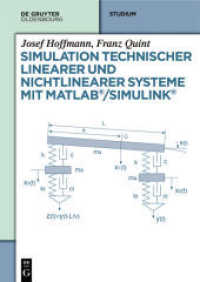- ホーム
- > 洋書
- > 英文書
- > Science / Mathematics
Full Description
Human Fatigue Risk Management: Improving Safety in the Chemical Processing Industry teaches users everything they need to know to mitigate the risk of fatigued workers in a plant or refinery. As human fatigue has been directly linked to several major disasters, the book explores the API RP 755 guidelines that were released to reduce these types of incidents. This book will help users follow API RP 755 and/or implement a fatigue risk management system in their organization.
Susan Murray, a recognized expert in the field of sleep deprivation and its relation to high hazard industries, has written this book to be useful for HSE managers, plant and project managers, occupational safety professionals, and engineers and managers in the chemical processing industry. As scheduling of shifts is an important factor in reducing fatigue and accident rates, users will learn the benefits of more frequent staff rotation and how to implement an ideal scheduling plan.
The book goes beyond API RP 755, offering more detailed understanding of why certain measures for managing fatigue are beneficial to a company, including examples of how theory can be put into practice. It is a simple, digestible book for managers who are interested in addressing human factor issues at their workplace in order to raise safety standards.
Contents
Chapter 1: The consequences of fatigue in the process industries
Chapter 2: Basics of sleep biology
Chapter 3: Circadian rhythms and sleep-circadian interactions
Chapter 4: Sleep hygiene recommendations
Chapter 5: Sleep disorders
Chapter 6: Fatigue and human performance
Chapter 7: Fatigue and accidents
Chapter 8: Fatigue-related regulations and guidelines
Chapter 9: Fatigue counter measures
Chapter 10: Work shifts
Chapter 11: Work environment
Chapter 12: Work task design
Chapter 13: Employee training
Chapter 14: Naps
Chapter 15: Compounds that alter sleep and wakefulness
Chapter 16: Creating a fatigue risk management system (FRMS)
Chapter 17: Accident investigation







